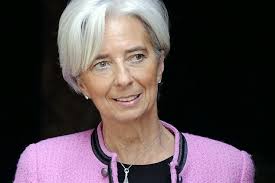 By Peter OBIORA InvestAdvocate
By Peter OBIORA InvestAdvocate
Lagos (INVESTADVOCATE)-Christine Lagarde, the managing director of the International Monetary Fund (IMF) on Monday visited Nigeria to discuss the issues of the nation’s economic challenges.
The Fund says Lagarde during her visit will engage policy makers and other stakeholders in both Nigeria and the sub-region to underline the IMF’s strong relationship with its African member countries.
According to the global financial institution, the visit to Nigeria will provide an opportunity to strengthen the Fund’s partnership with the largest economy in sub-Saharan Africa. In Abuja, Lagarde is expected to meet with President Muhammadu Buhari and other seniour leaders, along with business leaders, prominent women, and representatives of civil society. “She will also meet with legislators,” a statement from the Fund affirmed.
“I look forward to productive meetings with President Buhari and his colleagues as they address important economic challenges, most importantly the impact of low oil prices,”
Lagarde said ahead of her trip. “Nigeria is working hard to improve its business environment, promote opportunities for growth in the private sector, and strengthen social cohesion, all areas where the government has an important role to play.”
In the same vein, she is expected to also visit Nigeria’s neighbour Cameroon, where she will meet President Paul Biya and his economic team, as well as private sector executives, women leaders, and other members of Cameroonian society. She will also meet with Finance Ministers from the six member countries of the Economic and Monetary Community of Central Africa (CEMAC), delivering a speech to the group on January 8.
“As the largest and most diversified economy in CEMAC, Cameroon is well placed to sustain, and reinforce, the momentum of integration,” Ms. Lagarde said. “The country and the entire CEMAC region are confronted with the twin shocks of the oil-price slump and a surge in disruptions related to security. Reinforcing regional integration and implementing ambitious reform agendas in CEMAC countries will be key to secure macroeconomic stability and restore strong and inclusive growth in the region.”






